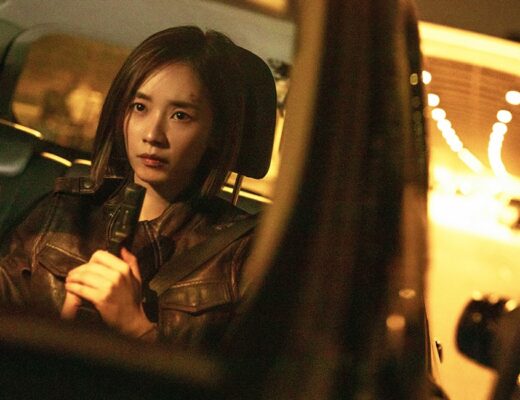Human Nature‘s looping narrative games don’t always work, but overall the film makes for an effective study of middle-class malaise.
There’s not one, but two structural/temporal gambits in Human Factors. In the film, an upper-middle-class family travels to the seaside for a weekend getaway following tumultuous events at home; it’s clear from the beginning that there is some tension between mom, Nina (Sabine Timoteo), and dad, Jan (Mark Waschke), as they converse in clipped sentences and force begrudging smiles through pursed lips. As they unpack and get settled in, Jan goes to the store for groceries. Upon his return, he finds Nina in hysterics, claiming that she surprised some thieves who then ran off. It’s a seemingly small thing; no one is hurt, and nothing was stolen, but the act becomes the fulcrum from which this familial unit totally unravels. The event likewise serves the same function for the narrative, as writer/director Ronny Trocker returns to this inciting incident over and over again, examining it from each family member’s perspective.
Further complicating matters is a jumbled-up chronology that surrounds these events, leading up to and continuing after the disrupted vacation, which alters our typical reliance on a linear, cause-and-effect narrative trajectory. At first blush, one can’t help but be reminded of the tricky plotting gymnastics of someone like Christopher Nolan, but it gradually becomes clear that Trocker isn’t particularly interested in mystery (although the film frequently teeters on the edge of becoming a thriller). Each change of perspective reveals little additional information about the aborted home invasion — this isn’t another Rashomon riff, thankfully — but instead allows each member of the family to momentarily control the narrative; young son Max (Wanja Valentin Kube) mourns the loss of his pet rat who escapes during the commotion, while surly teenage daughter Emma (Jule Hermann) stumbles across a potentially dangerous house party with some locals. Trocker also expands his considerations to include a kind of State of the European Union, as Nina and Jan’s advertising firm mulls taking on a political client who, it is strongly implied, might be a right-wing nationalist candidate, and a steady, unsettling hum of news plays in the background of several scenes.
It’s a lot to take in, and it’s arguable that the looping narrative games obfuscate more than they elucidate. We eventually meet Nina’s younger brother, his new boyfriend, one of Nina’s exes, and get glimpses of the family’s home life, each a new wrinkle emanating out from the question of what exactly happened that day in the vacation house. Somewhat curiously, Trocker actually offers an answer, which we won’t spoil here, but it is sure to annoy some viewers with its casual flippancy. But the proffered “answer” ultimately isn’t the point of Human Factors, which instead suggests that both the love and animosity that underscore a close-knit family are ever-present, simultaneous and coexistent. Trocker has a firm grasp of his material, and the entire cast suitably delivers natural, unforced performances. It all adds to a highly effective study of middle-class malaise, less a puzzle to solve than a tapestry to contemplate.
Originally published as part of Sundance Film Festival 2021 — Dispatch 1.







